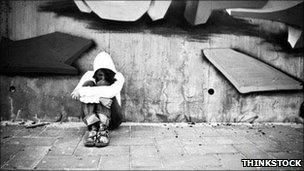Ministers stick with 2020 Welsh child poverty target
- Published

Ministers say they will stick to their plan to lift children out of poverty by 2020
Ministers are sticking to a target to eradicate child poverty in Wales by 2020, although the problem is predicted to rise in the next three years.
The "ambitious" target was re-stated when the Welsh assembly government unveiled a new child poverty strategy.
It said it would do everything it could to meet the goal, despite the impact of the recession and public spending cuts.
The Conservatives said targets should be achievable and the Liberal Democrats said the strategy was overdue.
The strategy says absolute and relative child poverty is predicted to rise in the next three years.
Some 200,000 children in Wales are classed as being in poverty - living on an income of less than 60% of the median.
The proportion of children in poverty fell between 1997-98 and 2003-04 to 28%, but has now risen to 32%. This compares to 31% for the UK.
The strategy, which has had 150 responses during consultation, says getting people into work will be the government's first priority.
It points out that in December about a quarter of Wales' working age population was economically inactive and 8.6% were unemployed, meaning more than one-third of adults were not earning.
'Ambitious but realistic'
Deputy minister for children Huw Lewis said the campaign against poverty was even more important in the face of cuts to public spending.
"Yes, I think it's ambitious, but yes I think it's realistic and it's necessary," he said.
"We can't continue in Wales to have a third of our population being left behind.
"This isn't a small minority of Welsh children - this is one in three that we are talking about here."
He said the potential for devolution to improve poverty rates should not be underestimated. The assembly government is responsible for half of public spending in Wales, he said.
Councils and other public bodies must develop their own anti-poverty strategies under legislation passed by the assembly last year.
The new strategy will include more "bespoke" services to make sure that poor families get the help they need.
Mr Lewis said the assembly government's families first scheme, to be rolled out in April 2012, will provide better joined-up support for families.
Officials point to two pioneer projects - one in Wrexham and another in Rhondda Cynon Taf - where key workers can be assigned to families to make sure they receive appropriate help.
Under the schemes, families can be referred to the best services by schools, doctors, social services or when they come into contact with the police.
First Minister Carwyn Jones said the strategy showed the government was "fully committed to doing everything within our powers" to achieve the 2020 target.
'Not pie in the sky'
"The current economic climate makes it even more important that we retain our commitment to tackling child poverty, by prioritising the needs of the poorest and protecting the most vulnerable."
No single organisation would be able to deal with child poverty on its own, he said.
"But now, more than ever, it is imperative that we all redouble our efforts and work collectively together to eradicate child poverty."
Welsh Conservative leader Nick Bourne said: "I think just setting a target as if that's the job done is a mistake.
"Targets have got to be achievable and not pie in the sky and I am afraid very often they appear to be the latter and not the former."
Welsh Lib Dem spokeswoman Eleanor Burnham said: "Finally, the Labour-Plaid government seems to be taking action against child poverty rather than just talking about it.
"I find it quite astonishing that with only a couple of months before the assembly election they come up with a plan of how to reduce the number of children living in poverty in Wales."